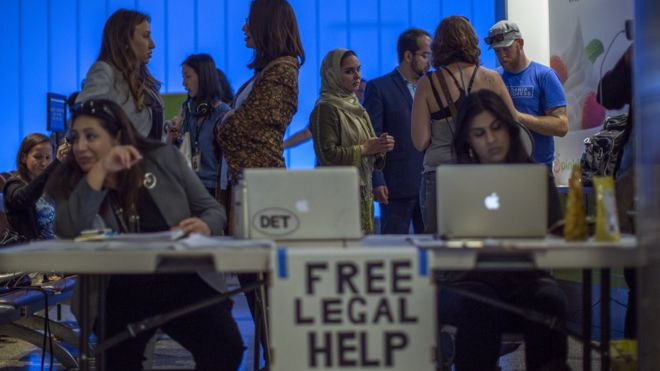People from six mainly Muslim countries and all refugees now face tougher US entry due to President Donald Trump’s controversial travel ban.
It means people without “close” family or business relationships in the US could be denied visas and barred entry.
Monday’s Supreme Court ruling upheld the temporary ban, a key Trump policy.
But the judges provided a major exception, for those who have “a credible claim of a bona fide relationship” with someone in the US.
The effect is that citizens of the affected countries with a close relative in the US, such as a spouse, parent, child or sibling, will potentially be allowed in.
In a last minute change, the Trump administration extended the definition of close family to include fiancés.
However grandparents, aunts, uncles, nephews and nieces are not considered to be “bona fide” relations.
The rules apply to people from Iran, Libya, Syria, Somalia, Sudan and Yemen, as well as to all refugees.
Moments before the ban began at 20:00 Washington time (00:00 GMT), it emerged that the state of Hawaii had asked a federal judge for clarification.
Hawaii’s attorney general has argued that the definition of “close family” is too narrow and may improperly prevent people from travelling to the US.
The American Civil Liberties Union (ACLU) said it would be closely monitoring the guidance and implementation of the order.
An official with the Department of Homeland Security said it expected “business as usual at ports of entry”, adding: “Our people are well prepared for this.”
Immigration rights activists and lawyers said they would be on hand at major US airports ready to help arrivals and ensure those with valid visas were allowed in.
The Supreme Court is expected to make a final decision on the ban in October.
According to the new rules, for the next 90 days those from the six countries without a close relationship will not be able to enter the US.
IN – a parent, spouse, fiancé, child, son- or daughter-in-law, or sibling, including step- or half-siblings.
OUT – grandparents, aunts, uncles, nieces, nephews, in-laws, extended family and grandchildren.
Also exempt from the new rules are those with business or educational ties to the US.
However, the guidelines specifically state that the relationship must be formal, documented and not formed for the purpose of evading the order.
Those who already hold valid visas are not affected. Dual nationals who travel on their passport from the unaffected country will also be allowed entry.
The court also approved a 120-day ban on refugees entering the US, allowing the government to bar entry to refugee claimants who cannot prove the same ties to an American individual or entity.
BBC



